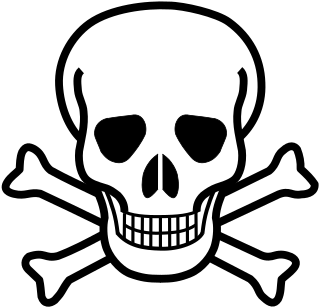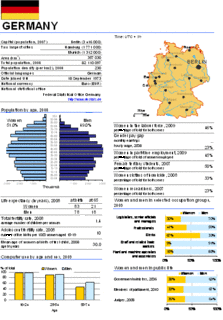The Population Activities Unit (PAU) is a unit of the United Nations Economic Commission for Europe (UNECE) under the Environment, Housing, and Land Management Division.
The unit handles population-related issues in the member states of the UNECE and supports the implementation of the final documents of inter-governmental conferences on population issues, and contributing towards better-informed policy-making by organizing programmes of data collection and research.

The Convention on Long-Range Transboundary Air Pollution, often abbreviated as Air Convention or CLRTAP, is intended to protect the human environment against air pollution and to gradually reduce and prevent air pollution, including long-range transboundary air pollution. It is implemented by the European Monitoring and Evaluation Programme (EMEP), directed by the United Nations Economic Commission for Europe (UNECE).

A census is the procedure of systematically calculating, acquiring and recording information about the members of a given population. This term is used mostly in connection with national population and housing censuses; other common censuses include the census of agriculture, and other censuses such as the traditional culture, business, supplies, and traffic censuses. The United Nations defines the essential features of population and housing censuses as "individual enumeration, universality within a defined territory, simultaneity and defined periodicity", and recommends that population censuses be taken at least every ten years. United Nations recommendations also cover census topics to be collected, official definitions, classifications and other useful information to co-ordinate international practices.

The United Nations Economic Commission for Europe is one of the five regional commissions under the jurisdiction of the United Nations Economic and Social Council. It was established in order to promote economic cooperation and integrations among its member states.

Toxicity is the degree to which a chemical substance or a particular mixture of substances can damage an organism. Toxicity can refer to the effect on a whole organism, such as an animal, bacterium, or plant, as well as the effect on a substructure of the organism, such as a cell (cytotoxicity) or an organ such as the liver (hepatotoxicity). By extension, the word may be metaphorically used to describe toxic effects on larger and more complex groups, such as the family unit or society at large. Sometimes the word is more or less synonymous with poisoning in everyday usage.
UN/LOCODE, the United Nations Code for Trade and Transport Locations, is a geographic coding scheme developed and maintained by United Nations Economic Commission for Europe (UNECE). UN/LOCODE assigns codes to locations used in trade and transport with functions such as seaports, rail and road terminals, airports, Postal Exchange Office and border crossing points. The first issue in 1981 contained codes for 8,000 locations. The version from 2011 contained codes for about 82,000 locations.
The UNECE Convention on Access to Information, Public Participation in Decision-making and Access to Justice in Environmental Matters, usually known as the Aarhus Convention, was signed on 25 June 1998 in the Danish city of Aarhus. It entered into force on 30 October 2001. As of March 2014, it had 47 parties—46 states and the European Union. All of the ratifying states are in Europe and Central Asia. The EU has begun applying Aarhus-type principles in its legislation, notably the Water Framework Directive. Liechtenstein and Monaco have signed the convention but have not ratified it.
The Convention on Environmental Impact Assessment in a Transboundary Context is a United Nations Economic Commission for Europe (UNECE) convention signed in Espoo, Finland, in 1991 that entered into force in 1997. The Convention sets out the obligations of Parties—that is States that have agreed to be bound by the Convention—to carry out an environmental impact assessment of certain activities at an early stage of planning. It also lays down the general obligation of States to notify and consult each other on all major projects under consideration that are likely to have a significant adverse environmental impact across boundaries.
Type approval or certificate of conformity is granted to a product that meets a minimum set of regulatory, technical and safety requirements. Generally, type approval is required before a product is allowed to be sold in a particular country, so the requirements for a given product will vary around the world. Processes and certifications known as 'type approval' in English are generally called 'homologation', or some cognate expression, in other European languages.

The World Forum for Harmonization of Vehicle Regulations is a working party (WP.29) of the Sustainable Transport Division of the United Nations Economic Commission for Europe (UNECE). Its responsibility is to manage the multilateral Agreements signed in 1958, 1997 and 1998 concerning the technical prescriptions for the construction, approval of wheeled vehicles as well as their Periodic Technical Inspection and, to operate within the framework of these three Agreements to develop and amend UN Regulations, UN Global Technical Regulations and UN Rules, kind of vehicle regulation.
The Coordinator of Government Activities in the Territories (COGAT) is a unit in the Israeli Ministry of Defense that engages in coordinating civilian issues between the Government of Israel, the Israel Defense Forces, international organizations, diplomats, and the Palestinian Authority. It is the main organ, remaining of the mostly defunct Israeli Civil Administration, which had governed the West Bank and the Gaza Strip between 1981 and 1994.
An emission inventory is an accounting of the amount of pollutants discharged into the atmosphere. An emission inventory usually contains the total emissions for one or more specific greenhouse gases or air pollutants, originating from all source categories in a certain geographical area and within a specified time span, usually a specific year.

The United Nations Sustainable Development Group (UNSDG), previously the United Nations Development Group (UNDG), is a consortium of 36 United Nations funds, programs, specialized agencies, departments and offices that play a role in development. It was created by the Secretary-General of the United Nations in order to improve the effectiveness of United Nations development activities at the country level.
Vehicle regulations are requirements that automobiles must satisfy in order to be approved for sale or use in a particular country or region. They are usually mandated by legislation, and administered by a government body. The regulations concern aspects such as lighting, controls, crashworthiness, environment protection and theft protection, and might include safety belts or automated features.
Government regulation in the automotive industry directly affects the way cars look, how their components are designed, the safety features that are included, and the overall performance of any given vehicle. As a result, these regulations also have a significant effect on the automotive business by generally increasing production costs while also placing limitations on how cars are sold and marketed. Automotive regulations are designed to benefit the consumer and protect the environment, and automakers can face stiff fines and other penalties if they are not followed.
A pollutant release and transfer register (PRTR) is a system for collecting and disseminating information about environmental releases and transfers of hazardous substances from industrial and other facilities.

Official statistics are statistics published by government agencies or other public bodies such as international organizations as a public good. They provide quantitative or qualitative information on all major areas of citizens' lives, such as economic and social development, living conditions, health, education, and the environment.
Motor vehicle type approval is the method by which motor vehicles, vehicle trailers and systems, components and separate technical units intended for such vehicles achieve type approval in the European Union. There is no EU approval body: authorized approval bodies of member states are responsible for type approval, which will be accepted in all member states.
The Convention on the Protection and Use of Transboundary Watercourses and International Lakes, also known as the Water Convention, is an international environmental agreement and one of five UNECE's negotiated environmental treaties. The purpose of this Convention is to improve national attempts and measures for protection and management of transboundary surface waters and groundwaters. On the international level, Parties are obliged to cooperate and create joint bodies. The Convention includes provisions on: monitoring, research, development, consultations, warning and alarm systems, mutual assistance and access as well as exchange of information.

The UNECE Environmental Performance Review (EPR) is an assessment process to evaluate the progress made by individual countries in improving their environmental policies. The EPRs are carried out under the auspices of the Committee on Environmental Policy of the United Nations Economic Commission for Europe (UNECE).

The Republic of Kazakhstan became a member of the United Nations on March 2, 1992. Kazakhstan was elected to serve on the UN Security Council for the 2017–2018 term. UN Secretary-General António Guterres in remarks to the UNSC recognized Kazakhstan's work to rid the world of weapons of mass destruction and global non-proliferation efforts.